| MUCH MORE THAN
DOLLARS
BY KIM PLUMMER KRULL

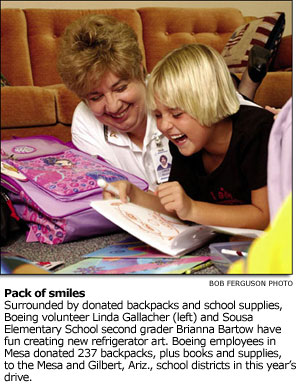 When
Richard Williams answered a call from Joanne Huggard, Boeing community
investor for the Pennsylvania region, the CityTeam Ministries executive
said it was a first. When
Richard Williams answered a call from Joanne Huggard, Boeing community
investor for the Pennsylvania region, the CityTeam Ministries executive
said it was a first.
"I never before had an organization tell me they want to come see
me and see how they can help," he said. "They always wait
until I come to them."
But making the first move made a lot of sense to Huggard. She had been
tracking the Philadelphia–area nonprofit agency, which serves some
70,000 people annually, helping the poor and disadvantaged kick drug and
alcohol problems, learn job skills and climb back on their feet.
"It's an agency that fills a desperate need in this community,"
Huggard said of the ministry, based three miles from Boeing's Philadelphia
facility. "I wanted to know if there was some way we could help
them do what their organization does so well."
Today, Boeing partners with the nonprofit through grants as well as through
employees who volunteer in the soup kitchen and stuff holiday stockings
for needy children. Huggard has served on a CityTeam committee that helps
youngsters get their school year off to a positive start.
This Boeing-initiated partnership is only one example of how the company's
strong tradition of good corporate citizenship — like the company
itself — is transforming.
So, why does the world's largest aerospace company work so hard
to help people and communities?
According to Toni Bailey, vice president of Boeing Community and Education
Relations, there is a direct link between a healthy business and a healthy
community.
"It is in the best interest of businesses as well as individual
citizens to be residents of a community with excellent educational institutions;
thriving, diverse cultural and art institutions; as well as civic and
environmental organizations that contribute to the overall quality of
life for its residents," Bailey said.
It's all about being a good corporate citizen, said Boeing Chief
Financial Officer Mike Sears.
"Investing in our communities is our responsibility," said
Sears. "We don't do it to get return on investment. We think
the right thing to do is to reinvest in the communities in which our employees
live and work."
And, it is from these communities that businesses draw their workforce.
In the end, "Citizens of these communities determine public policies
and craft laws that affect us all, and the list goes on as to the criticality
of what is meant by a healthy community," Bailey, who directs the company
in its global citizenship responsibilities, explained. "To the extent
that businesses can contribute to the development of this environment,
our contributions are critical investments."
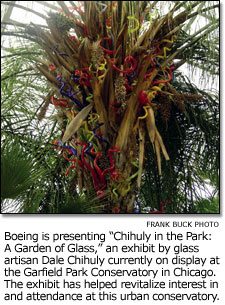 While
it might be good enough for some companies simply to write a check once
a year to their favorite charity, Boeing prefers a much bigger role. While
it might be good enough for some companies simply to write a check once
a year to their favorite charity, Boeing prefers a much bigger role.
"We're about so much more than giving dollars," said
Bailey. "Boeing always has had a commitment to enhancing the communities
where our employees live and work, but now we're doing it strategically.
We're being proactive and innovative and investing in ways that
can be even more beneficial than money."
One big way is by engaging employees who are willing — even eager
— to share their time, talents and expertise.
"A nonprofit may be long on mission and zeal but benefit from assistance
with management skills and strategic planning," Bailey said. "As
a company of leaders, we obviously have a host of those resources."
Laurette Koellner, chief People and Administration officer, agreed.
"In every instance I'm aware of, when someone from Boeing
volunteers, that person always has something in his or her bag of tools
to help their chosen charitable organization improve," Koellner
said. "Boeing volunteers are everywhere, and they're consistently
helping their chosen charities improve the ways in which they enrich their
communities."
Education is a major focus of many Boeing partnerships and collaborations.
Employees team up with local schools and sweeping national efforts.
As co-vice chair of Achieve Inc., Boeing Chairman and CEO Phil Condit
works with academic, business and political leaders across the country
to raise academic standards and improve schools in every U.S. state.
For the first time this fall, 10 Boeing executives will mentor prospective
principals as part of an innovative program to meet an alarming need in
Chicago.
"Forty percent of Chicago public school principals are due for
retirement within the next few years, and the traditional pipeline for
new principals isn't working," said Anne Roosevelt, Boeing
director of Community and Education Relations in Chicago.
Boeing partners with New Leaders for New Schools, an organization that
taps quality candidates from professions outside education and provides
a year of top-flight management and leadership training. "Our executives
have many of the leadership skills a good principal needs," Roosevelt
said. "This is an opportunity to model and coach and to make a difference."
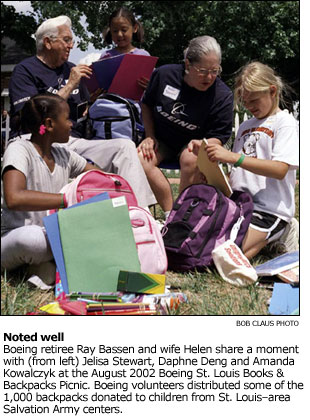 In
communities around the world, Boeing engineers lead workshops to help
teachers sharpen skills with hands-on science projects. They visit classrooms,
taking the mystery out of a profession about which many youngsters know
nothing. In
communities around the world, Boeing engineers lead workshops to help
teachers sharpen skills with hands-on science projects. They visit classrooms,
taking the mystery out of a profession about which many youngsters know
nothing.
In St. Louis, 150 Boeing engineers briefed 10,000 students in February
during National Engineers Week. As part of that same emphasis, young women
from area high schools traveled to Integrated Defense Systems headquarters
for a close-up look at opportunities in the field of engineering.
"In one day, the girls get to talk to a variety of women engineers"
about careers in high technology, said Pattonville High School counselor
Julie Kampshroeder, who brings top female science and math students to
Boeing. "It definitely gets them thinking."
In the United Kingdom, Boeing — along with the Institution of Mechanical
Engineers and other global aerospace companies — is seeking to generate
secondary school interest in the industry through a program called the
Schools Aerospace Challenge. Each year, teams of 16- to 18-year-old students
address a specific aerospace-related challenge, taking part in a competitive
exercise that involves research and design. This year, students are examining
air-to-air tanker refueling options for the country's Royal Air
Force. Cash prizes will be awarded to the winning team members and their
school in November.
The company also builds collaborations that touch lives around the globe.
Linda Martin, director, International and National Citizenship, is developing
strategies for Boeing to reach out globally.
Carol Cella, international community investor who manages Boeing's
International Relief Delivery Flights program, plays matchmaker with two
diverse partners — humanitarian agencies and airline customers. Her
goal: to use empty space on new airplanes to ship supplies to people in
need.
Since 1992, Boeing has helped deliver more than 2 million pounds of food,
medicine and other essentials to people in 30 countries on five continents.
When the East African Center (formerly Kenya Kids AIDS Project) collected
two tons of donations in Seattle, the agency was anxious to get the supplies
to orphans who live in what amounts to a Nairobi city dump. But shipping
costs would have run more than $16,000, way beyond the agency's budget.
Cella arranged for the cargo to travel on a new Boeing 767 bound for
customer Kenya Airways. "When we found out Boeing was sending a
plane to Kenya that we could use, it was like a miracle," said the
relief agency's Christy Nunez. "Without you guys, we could
have been sending supplies with volunteers, little by little, for the
next 10 years."
In Wichita, another collaboration helped build a museum. After a local
philanthropist launched the project with a generous donation, Boeing joined
with business and community leaders to help build the $62 million Exploration
Place science center.
Employees participated in every phase, from the engineering team that
helped select the architectural firm to the volunteers who led grand-opening
tours. When costs threatened to exceed budget, Boeing facilities project
manager Larry Pecenka spent two years as a loaned executive facilitating
construction.
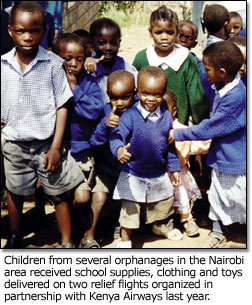 "There's
no doubt that Boeing was very instrumental in seeing that this multi-million-dollar
project ultimately was completed under budget and on time," said Mike
Germann, director of communications and public affairs in Wichita. "There's
no doubt that Boeing was very instrumental in seeing that this multi-million-dollar
project ultimately was completed under budget and on time," said Mike
Germann, director of communications and public affairs in Wichita.
Other avenues to community involvement are donations of time, money — employees
and retirees gave generously in 2001, including $8.4 million in relief
funds for victims of Sept. 11 tragedies — and even surplus office
furniture. That last may sound less impressive than a multi-million-dollar
museum or tons of relief supplies. But when fire gutted the studio of
the Tennessee Children's Dance Ensemble, the state's official
goodwill ambassadors were desperate to reestablish their headquarters.
Amy Reagan, Boeing community investor in Oak Ridge, answered the group's
call for help with desks, tables and chairs the company no longer needed.
"One of our board members said Boeing is the kind of company that helps
when it can," said Laura Kress, marketing director for the state's official
goodwill ambassadors. "That furniture was like a fresh start."
One of Boeing's most enduring opportunities for community involvement
is the Employees Community Fund. This year, the annual ECF campaign exceeded
its companywide goal and raised a projected $36.2 million for health and
human services and other vital community needs where employees live and
work.
That's a significant accomplishment — especially during a year
of layoffs, said Richard E. Spangler Jr., company campaign manager for
the ECF, which began more than 50 years ago and is among the world's
largest employee-owned and -managed charitable organizations.
Boeing employees know their communities count on the ECF, Spangler said.
"Just imagine if we suddenly pulled $36 million away from our communities.
Imagine the dramatic impact that would have on services so many people
need and, eventually, the impact on the quality of all our lives" he said.
Because the company covers all ECF administration costs, 100 percent
of every employee contribution goes back to local nonprofits.
Employees also donate their time through company-sponsored drives and
a wide variety of organizations outside Boeing.
The March of Dimes' Laura Boone minces no words about the value of Boeing
volunteers. For years, Boone has depended on the Boeing Amateur Radio
Club for communications and safety coordination in the St. Louis leg of
WalkAmerica, the charity's biggest fundraiser. "We couldn't have a walk
without you," she said.
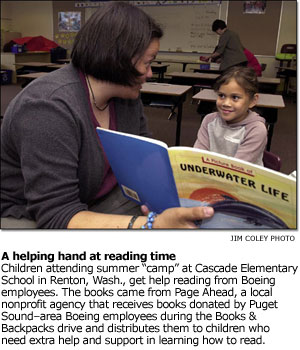 Volunteerism
is such a part of Boeing's corporate culture that judges struggle to select
the final four for the William Allen Award for exemplary volunteer service. Volunteerism
is such a part of Boeing's corporate culture that judges struggle to select
the final four for the William Allen Award for exemplary volunteer service.
"We have people who give up vacations, go overseas, and spend their
own money to help people in need," said Sue Patterson, manager of
Boeing Volunteer Programs. "We have some volunteers who are truly
inspiring."'
Named for a former Boeing president with a deep commitment to community,
the program recognizes one employee from each region for volunteer efforts
outside the company.
One recent honoree: Alberto Colin, manager for Integrated Defense Systems'
Southern California Test and Evaluation Division in Long Beach. Three
days a week after work, Colin drives 15 miles to the Toberman Settlement
House in San Pedro to tutor at-risk kids.
Colin discovered the youth center through a company publication. "Boeing
made me aware of the opportunity," he said. "The kids keep
me coming back."
That volunteer spirit can run so deep that, for many, it doesn't
end with retirement. Some of the most active volunteers are members of
the Boeing Blue Bills and McDonnell Douglas-Boeing SAGES retiree clubs.
The Blue Bills were busy this summer stocking shelves and distributing
supplies at the Kids in Need Resource Center, a Boeing-donated warehouse
near Renton. Last school year, area teachers picked up $2 million in supplies
for needy students.
Boeing retiree Judy [Derbes] Leyden handles many of the center's administrative
chores. But the task she enjoys most is helping teachers shop.
"They are so accustomed to spending their own money to provide
basics for kids who are lucky if they come to school with a pencil,"
Leyden said. "We've had teachers hug us and say thanks with
tears streaming down their faces."
Those hugs are only one return on Boeing's community involvement.
It's an investment designed to strengthen communities, says Toni
Bailey.
Quality schools produce better-educated students and a stronger work
force. Healthy communities attract and keep people who want to live and
work in them.
As global expansion continues, Bailey says, Boeing will become a part
of more communities and regions where the company does business outside
the United States. She is working with Tom Pickering, senior vice president,
International Relations, to develop strategies for international community
involvement.
Boeing-Australia, which employs the largest number of Boeing employees
outside the United States, actively supports its local communities through
programs such as the International Air Training Corps, which promotes
the development of young Australians through an international exchange
program and has links to the Royal Australian Air Force.
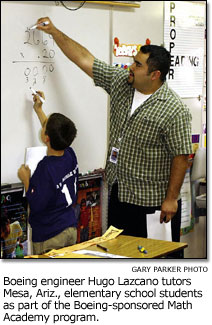 The
region also lends support through a just-launched Employees Community
Fund at Boeing subsidiary Hawker de Havilland, as well as through contributions
to community support organizations. This summer, Hawker de Havilland presented
checks to the Lord Mayor's Charitable Fund and United Way Australia, benefiting
more than 16 charities that provide care for groups including the disabled,
the homeless, and children suffering from cancer. The
region also lends support through a just-launched Employees Community
Fund at Boeing subsidiary Hawker de Havilland, as well as through contributions
to community support organizations. This summer, Hawker de Havilland presented
checks to the Lord Mayor's Charitable Fund and United Way Australia, benefiting
more than 16 charities that provide care for groups including the disabled,
the homeless, and children suffering from cancer.
"It is great to see real people behind the charities and to hear
about the tangible ways they are committing to spend the money,"
said Hawker de Havilland Managing Director Lindsay Anderson. "An
important part of these events is that the charities have been chosen
by employees because in some way or other they have either touched on
or are close to their hearts."
Involvement strategies may differ around the globe. Where education,
for example, is a major focus of community involvement in the United States,
different cultures may point to other needs and issues.
In Beijing, for example, high pollution levels are a major environmental
concern. As part of its anti-pollution campaign, the municipal government
had been encouraging each person in the city to plant 10 trees in their
lifetime. In support of this effort to make Beijing greener and cleaner,
the entire staff of Boeing China's Beijing office, some friends
and spouses spent a day in May planting trees at nearby Chaoyang Park,
one of the largest and newest public areas in the city. Four visitors
from Boeing facilities in Seattle and Wichita also took part, helping
to plant 45 trees.
But the goal remains the same: Where Boeing is involved, communities
are enhanced. "And everyone — our society, our company and you
and I as individuals — benefits," Bailey said.
International Relief Delivery Flights' Carol Cella agreed. Through
her contacts with humanitarian organizations worldwide, she hears about
many great needs.
"When one of our Boeing planes is used to bring comfort to people
and make life a little better for them, it's a good feeling,"
she said. "It's rewarding to work for a company that cares
about corporate citizenship."
|